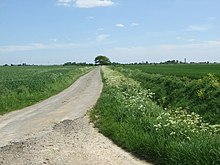Open terrain,open countryoropen groundisterrainwhich is mostly flat and free of obstructions such as trees and buildings. Examples includefarmland,grasslandand specially cleared areas such as anairport.[1]

Such terrain is significant inmilitary manoeuvreandtacticsas the lack of obstacles makes movement easy and engagements are possible at long range. Such terrain is preferred toclose terrainfor offensive action as rapid movement makes decisive battles possible.[2]
Wind loadingtends to be high in open country as there are few obstacles providing awindbreak.This affects the design of tall structures suchelectricity pylonsandwindmills.[1]
See also
editReferences
edit- ^abAlain Peyrot (2010),Wind Loading,American Society of Civil Engineers, p. 199,ISBN9780784410776
- ^Patrick Edmund O'Sullivan, Jesse W. Miller (1983), "Close and Open Terrain",The Geography of Warfare,Taylor & Francis, p. 63,ISBN9780709919186